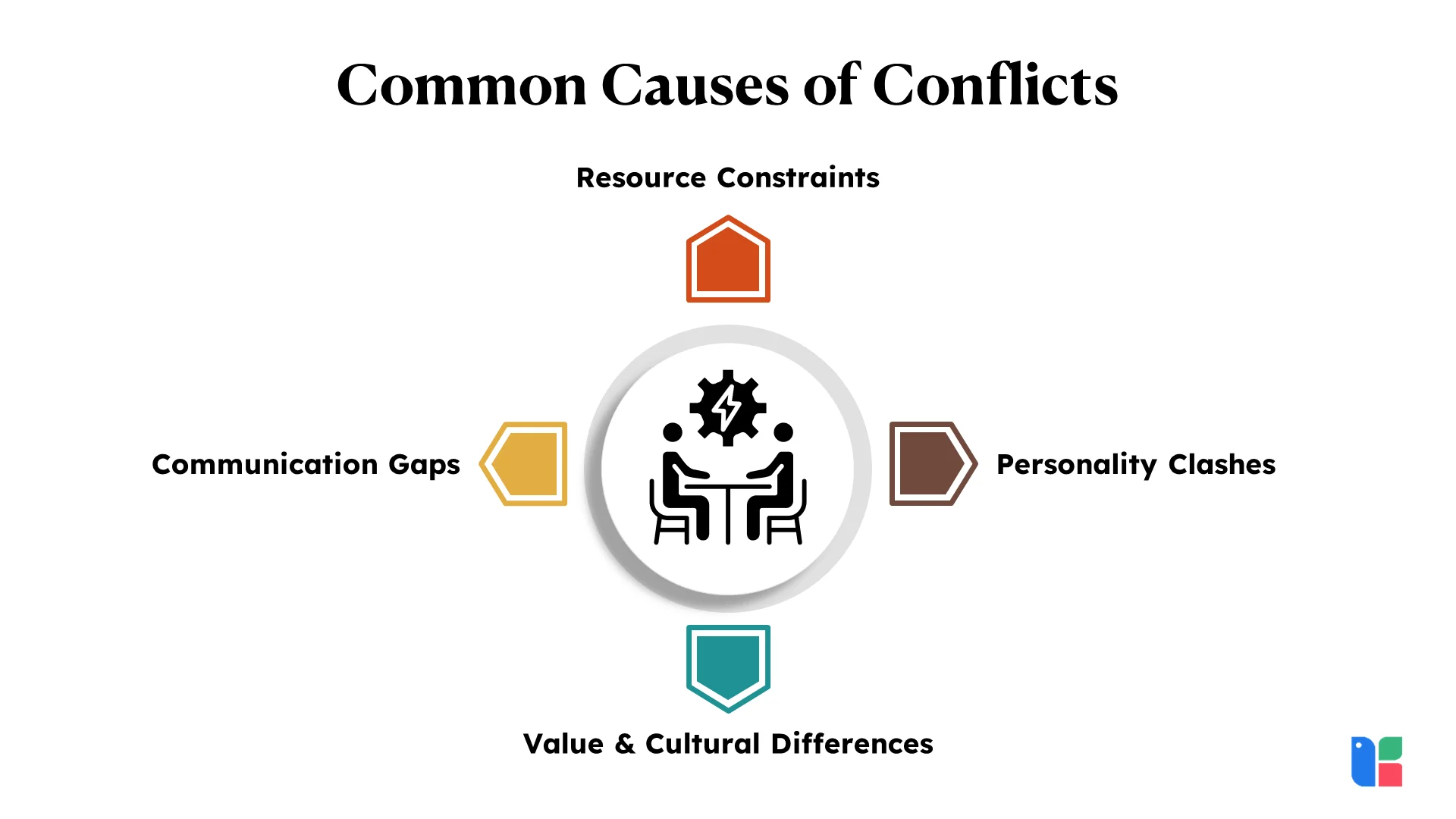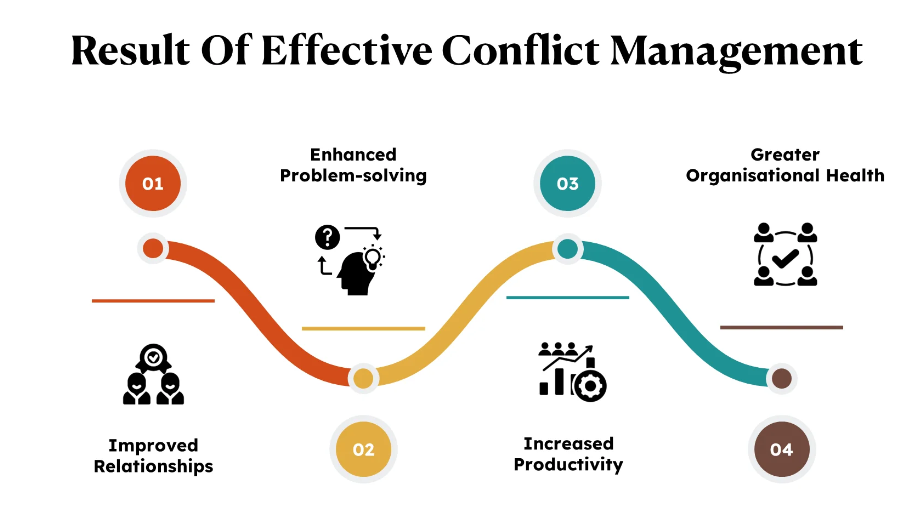Negotiation and Conflict Management - A Powerful Technique
Table of Contents

- jaro education
- 30, October 2024
- 4:00 pm
Conflict is a natural and unavoidable aspect of any organisational setting and society, irrespective of its composition, location, and people involved. When people share different opinions, space, and facilities, it can often lead to conflict and agitation for both parties.
To come to a common ground without any negative consequential effects, it is essential for one to have skills such as negotiation and conflict management. Having an understanding of these concepts is crucial to harnessing the benefits of healthy conflicts and overcoming conflicts that weaken organisations.
One of the best ways to master these concepts is by pursuing an online MBA course. In this blog, we’ll read more about conflict negotiation and management, skills, strategies, and everything else you need. Let’s get started!
What is Conflict Negotiation?

*wellable.co
Conflict negotiation is a process that aims to resolve differences, disputes, or disagreements between two parties by finding mutually acceptable solutions. It is a communication strategy where the parties involved engage in discussions to address their concerns and needs. With this process, satisfactory outcomes can be created by reducing the negative impact of disagreement a conflict has on an organisation.
Negotiation is a popular method of resolving conflicts as it involves achieving solutions that respect the perspectives of both sides. It can involve active listening, open conversion, compromises, analytical thinking, compromise, and, at times, concessions. Those who hone negotiation skills will prove worthy assets in a variety of situations that arise in the workplace.
Common Causes of Conflicts in Different Settings
Let’s explore the key factors that can lead to conflicts:
Value and Cultural Differences: People coming from different backgrounds can have varied perspectives. This can often lead to clashes between individuals or groups without any mutual understanding.
Limited Resources: Having resource constraints in an organisation can create competition among members and spark conflicts.
Communication Gaps: Lack of effective communication and misunderstandings can escalate into serious conflicts.
Differences in Personalities: Clashes can happen between people due to personalities and working styles.

*kapable.club
Why is Conflict Negotiation and Management Necessary?
Conflict Negotiation and management are two concepts in organisational settings and interpersonal dynamics that are closely related yet different. They overlap yet interact with each other and play a unique role in how businesses sail through dispute resolution.
Developing strong conflict management and negotiation skills is essential to thrive in today’s work environment. These skills can help you navigate difficult situations, create positive working relationships, reach an agreement for challenging situations, and drive positive outcomes. Additionally, negotiation and conflict management skills can also assist in identifying deep-rooted issues that may not be apparent at the moment but can cause problems when dealing with conflicts. For such reasons, these two skills have become emerging skills for anyone joining today’s workforce.

In addition to this, it is also imperative to understand the difference between negotiation and conflict management. Head to the next section to know more about it.
Difference Between Conflict Negotiation and Management
As discussed above, negotiation is the process of coming to a mutual agreement on an issue. On the contrary, conflict management is the process of managing any disagreement or conflict that arises between two or more people.
Given below is a table that draws the main difference between negotiation and conflict management.
| Aspect | Negotiation | Management |
|---|---|---|
| Scope | A transactional and tactical strategy that resolves a dispute through dialogue and agreement | A strategic and ongoing strategy used to prevent and resolve conflicts |
| Objectives and Focus | Aims to come to a mutual agreement and focus on specific issues. | Aims to improve interactions and prevent disputes. It is focused on culture and relationships |
| Techniques Used | Active listening, Bargaining, Persuasion, Mediation | Protocols, Emotional Intelligence Training, Interaction, Feedback |
| Duration | A continuous and ongoing process that adapts to new conflicts | Techniques Used |
| Outcomes | Tangible and immediate outcomes are measured by terms of agreement and implementation method. | Long-term and qualitative outcomes are measured by team cohesion, minimised conflicts, and productivity. |
Skills Required for Mastering Negotiation
Partnerships, collaborations, and cracking deals are an important part of any business’s usual day. To thrive in today’s dynamic and competitive business landscape, especially in matters related to negotiation and conflict management, it is necessary for you to gain a diverse skill set.
Here are the key skills you need for success in the business world:
- Communication
- Resilience
- Empathy
- Ability to manage emotions
- Analytical Thinking
- Problem-Solving
- Conflict Resolution Skills
- Flexibility
- Networking
- Negotiation Strategy
- Cross-Cultural Competence
- Conflict Management
- Ethical Decision-Making
- Time Management
- Influence and Persuasion
To arrive at a mutually agreeable solution for a dispute, mediators or negotiators must have some hands-on skills. Courses like an online MBA teach negotiation and conflict management in detail. It provides the students with a conducive environment to acquire and enhance such skills to help them excel in their careers. Apart from this, they also offer real-time opportunities and experiences to learn strategies that can cultivate the prowess of students in negotiation.
Best 4 Proven Strategies for Negotiation in Conflict Resolution
To achieve success in a conflict via effective negotiation, you must not only clearly understand the potential pitfalls but also have a robust strategy toolkit to address conflicts as and when they arise. Below, we’ve covered five compelling strategies that can navigate the complex terrain of negotiations:
Listen Actively at the Negotiation Table
Active listening is a powerful tool for dealing with negotiation and conflict resolution. In situations when the negotiation process is about to take a negative turn, it becomes vital to listen attentively. Negotiating with someone under pressure? Handling a disappointed customer? No matter what the situation is, active listening can help satisfy people and create ways to reach a consensus.
Additionally, in negotiation and conflict management, it is crucial to recognise the underlying pressures that create obstacles in progress. Active listening identifies opportunities to present variables like cost-effective concessions and delivery timelines.
This strategy also proves valuable when dealing with legitimate grievances. When concessions or apologies don’t suffice, root causes of dissatisfaction can be analysed by listening to unspoken concerns. When we listen to what remains unsaid, it becomes helpful to gain valuable information and rebuild trust and resilience in conflict management negotiation.
Avoiding Conflicts Can Take Negotiation Off the Rails
Have you ever been in a situation where abiding by your real feelings was the only way out of a situation? Well, this strategy may work for our emotions but not in corporate behaviours when dealing with conflict and negotiation. When there are underlying feelings of suspicion or distrust between the parties, it can take negotiation off the track.
Wake-up calls are always there before a conflict emerges, even if they’re present at a low level. By observing closely, you can watch for indications that a dead end is on the way. At times, neither of the parties wants to instigate the stalemate. However, it is important to know how to use this strategy and also defend against it. Moreover, recognising when it’s not a strategy but a sign of something that may go wrong is even more imperative.
Once you learn the art of spotting stalemate tactics in negotiation and conflict management, it becomes easier to see if the current obstacle is a part of the strategy or a real problem. Instead of avoiding conflict and directly moving forward towards a serious negotiation breakdown, strong negotiators use tools like new information and change of structure of negotiation in resolving conflicts.
If used well, this method can help avoid crises and create a win-win outcome for both parties, ensuring a long-term, resilient relationship.
Know Your Negotiation Mode
Before acting on a dispute with negotiation strategies, it is crucial to identify the type of conflict to address the underlying problems effectively. Disputes can be related to contracts, finance, individual relations, strategic decisions, intellectual properties, employment, supply chain, compliance, and more.
So when any type of conflict arises, take a step back, understand the situation and then think of the negotiation mode you’re in. Staying alert during the negotiation mode will ensure you never lose ground. Read theories on negotiation and conflict management to differentiate negotiation modes in organisational contexts.
When a Small Problem Becomes a Big Issue
Everyone faces a situation once in a lifetime when a molehill becomes a mountain out of nowhere. Picture this: a company leader waits to crack a deal only to realise that goalposts are moving. Eventually, a small thing can become a big issue.
Negotiators must take the goalpost moving as a sign that the parties aren’t clear on the differentiating factors of provisional understanding and a finalised agreement. In such situations, poor communication takes the lead, and chances are that negotiations can be put off-track. If a party is moving the goalposts to gain strategic ground, and you are on the other end, then learning how to counter it is key to gaining a strong stand.
Goalpost shifting is a great example of when a small problem becomes a big deal; negotiators must know how to redirect the situation to their advantage. Mastering the art of conflict management negotiation can help reclaim an upper hand and resolve the issue without any loss
Learn Conflict Negotiation and Management With an Online MBA from Symbiosis
In this ever-changing business landscape, the importance of conflict negotiation and management cannot be understated. It has now become vital to acquire these skills and advance your knowledge to propel you in the business world. With an online MBA degree from Symbiosis School for Online and Digital Learning, students can improve their strategic intelligence and equip themselves with the desired skills and knowledge for an excellent corporate career.
About the Online MBA Programme
Mode: 100% Online
Total Fees of the Programme: INR 3,00,000
The Online MBA is a two-year programme that focuses on the development of students as contemporary and effective leaders in the current business environment. This programme is curated to imbibe the working professionals with the highest quality education and make them stand out. In this course, working professionals can learn about negotiation and conflict management, entrepreneurship, business transformation, global business environment, crisis management and more. This UGC-entitled degree is available in 9 specialisations, including:
- Marketing
- Human Resource
- Finance
- Operations
- Agri Operations Management
- International Business
- Hospital and Health Care Management
- Logistics and Supply Chain Management
- Business Analytics
What Do You Get?
- UGC-Approved Degree from a NAAC ‘A+’ Accredited university
- Curriculum created by leading B-School experts from the top 10 Symbiosis Institutes in India
- Complete access to the Learning Management System
- Live Online Interactive Mode
- 100% Online Classes- No visits to campus required
- Experienced Faculty & Mentors
- Interact with Peers and Faculty for doubt-sharing and solving
- Scholarships Up to INR 50,000
Excel in your Career with Jaro Education
Jaro Education, India’s most trusted higher education and upskilling company, provides personalised counselling and offers career support to students – from assisting you in choosing the right course to placement assistance and even building a network. So, apply for the online MBA degree programme from Symbiosis School for Online and Digital Learning, through Jaro Education, and prepare to leverage Jaro Connect benefits.
The Jaro Connect portal gives you full access to networking and grow professionally by leveraging our networking opportunities. So, what keeps you waiting? Connect with us today and get started!
Frequently Asked Questions
Conflict management is an umbrella term that refers to how we detect and resolve issues in a fair and efficient manner. The goal is to reduce the possible negative consequences of disagreements while increasing the chances of a successful outcome.
Absolutely. Symbiosis is one of the renowned institutions in India, and its online MBA Degree Programme is designed for students seeking to improve strategic intelligence and pursue an excellent career. Their online MBA programme is recognised by the UGC and AICTE, and it holds the same value as a regular MBA programme. So, if you want to build a career in management, it’s time to enrol in the MBA programme offered by Symbiosis School for Online and Digital Learning.
Yes! At Jaro Education, we have partnered with top IIT and IIM colleges to create exclusive certification-based courses. We collaborate with universities to create these courses based on research and market insights.
A student planning to pursue an online MBA must be a graduate of a recognised university or an Institution of National importance. Moreover, they must have scored a minimum of 50% or equivalent at the graduation level.






![MBA Salary in India in 2024 [For Freshers & Experienced Professionals]](https://jaro-website.s3.ap-south-1.amazonaws.com/2024/07/MBA-Salary-in-India-in-2024-For-Freshers-Experienced-Professionals.jpg)
![Marketing-Executive-Salary-in-India-in-2024-[Average-to-Highest]](https://jaro-website.s3.ap-south-1.amazonaws.com/2024/06/Marketing-Executive-Salary-in-India-in-2024-Average-to-Highest.jpg)

